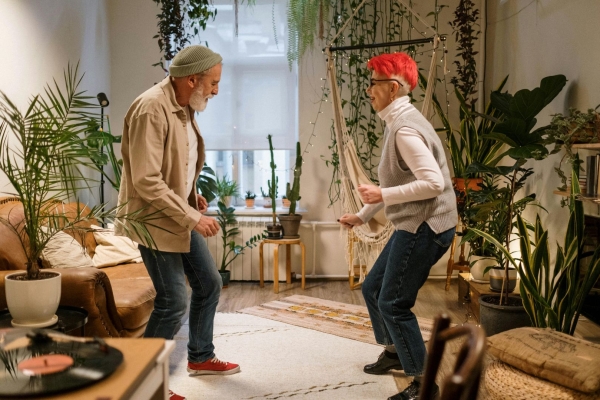How to Have a Happy Retirement

Plenty of people skip out of the office on their last ever day of work, kicking their heels as they go.
But when you’ve been used to a busy professional life, a structured routine, the company of colleagues, and having objectives to meet, many people find it daunting to imagine filling the days. Here are five ways to stay happy and healthy in retirement.
- Keep physically active
The NHS recommends that people aged 65 and over should get around 150 minutes of moderate intensity exercise every week – that means activities like riding a bike, dancing, pushing a lawnmower and walking.
Why not turn walking into a social activity by joining a local walking group? A nationwide scheme to encourage Walking for Health was launched in England in 2020, and today there are walking groups across the country organising walks for people of all ages and levels of fitness. Find your closest group at the Ramblers website, or at Paths for All for Scotland.
2 Exercise your mind
Studies have repeatedly shown that learning in older age makes for a happier life. Research published in 2014 showed that “informal types of learning” in a wide range of activities, including music, sewing, sports and fitness, were associated with higher wellbeing.
People taking part in the study said the benefits included keeping the mind active, acquiring new knowledge, meeting new people and making friends, as well as relaxation.
Learning a language can be a powerful way to keep your brain in shape. Dr Thomas Bak of the University of Edinburgh, writing for AgeUK.org.uk, says: “Even short periods of intensive language learning can produce measurable positive effects on cognitive abilities, and these persist in people who continue to practise their new language for five hours or more per week.”
3 Get a health check
Older people are at higher risk of health issues, from diabetes and high blood pressure to osteoporosis and eye problems, and early diagnosis, or indication of a higher risk, can often lead to more effective treatment.
People aged between 40 and 74 who do not have pre-existing conditions should be invited to an NHS Health Check by their GP or the local council every five years. These checks are designed to identify your risk of developing cardiovascular problems such as heart disease, stroke and type 2 diabetes. Contact your GP if you think you have been missed out.
Private medical insurers offer a range of comprehensive health checks, typically covering cholesterol and blood pressure, heart rhythm, screening for prostate testicular and breast cancer, and assessments of mobility and flexibility levels. Talk to your provider to find out what is on offer.
- Get creative
It’s official. Creativity is good for you. Government studies in 2017 showed involvement in the arts and culture were essential for wellbeing in older people; and creative and cultural involvement features high up on Age UK’s Wellbeing Index.
If you don’t feel like taking up painting or writing a novel, you can still get involved. Local theatres, festivals and museums often rely on teams of volunteers to help them thrive – and what better way to ease yourself into retirement than by joining a team of people who are so passionate about a project that they show up even though no one is paying them to.
5 Travel more
Where will you go first? The vineyards of Bordeaux? The roman ruins at Pompeii? The fjords of Norway? Perhaps you’re dreaming of a safari in Africa, or an adventure in Australia.
It’s hard to decide. Which is perhaps why increasing numbers of retirees are choosing not to choose. According to a survey by Norwegian Cruise Lines, 40% of older people were planning the trip of a lifetime, and the ideal duration for the adventure was nine months.
If you don’t have anyone to join you, and don’t fancy solo travel, a host of group travel operators are there to help. Try Intrepid for small group trips aimed at people of all ages (no upper limit – but those over 70 are asked to fill in a self-assessment form about their health and ability to travel), or Responsible Travel with tours for over 50s and over 70s.
30 January 2025




